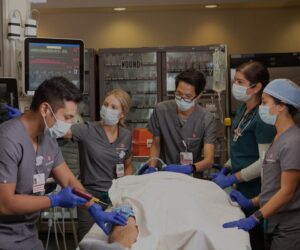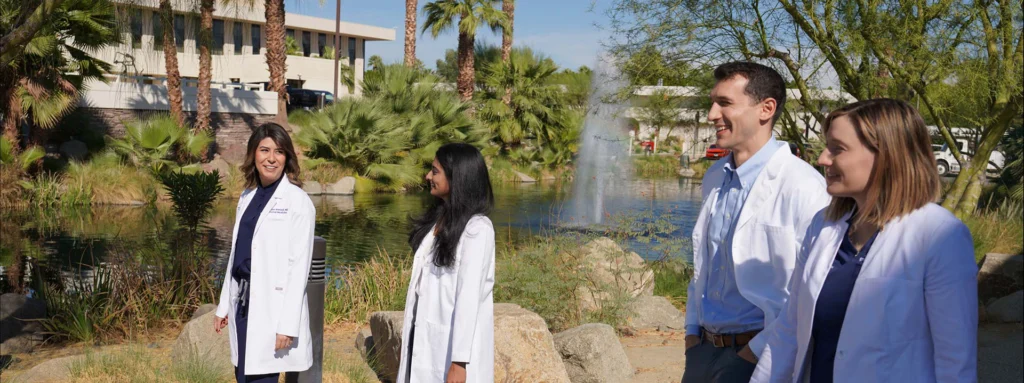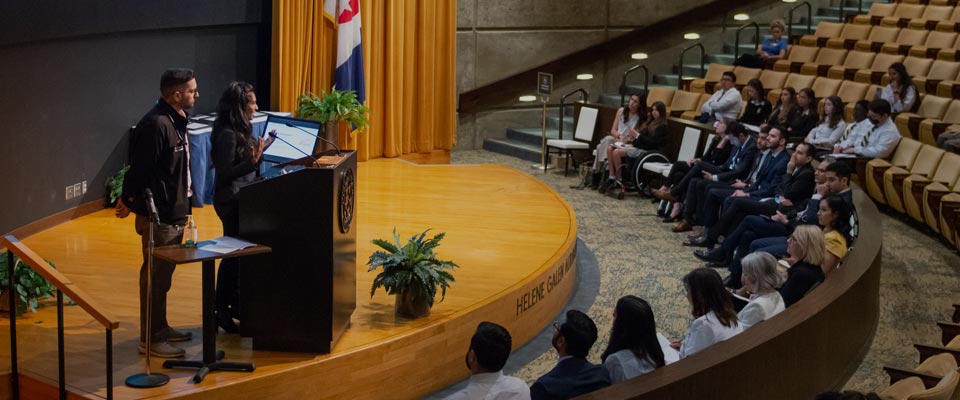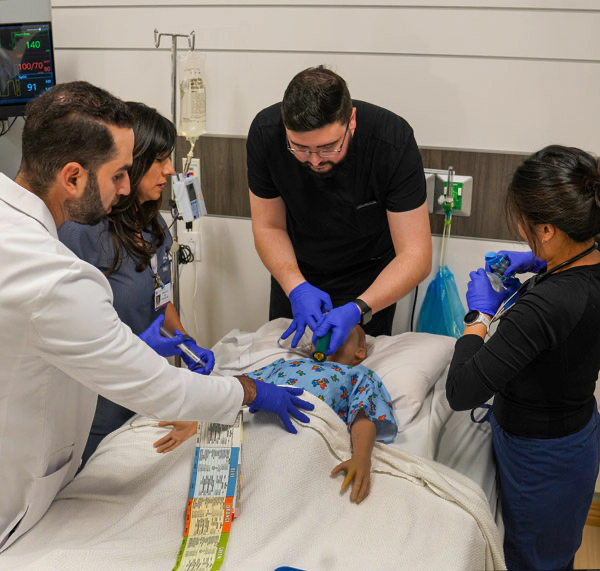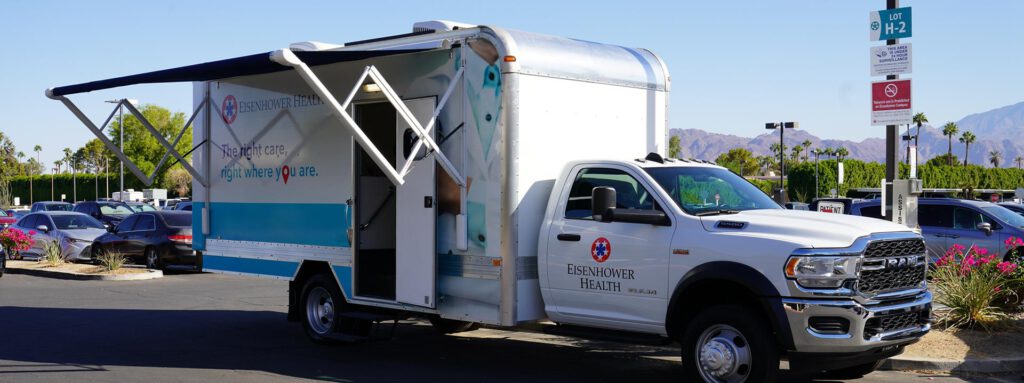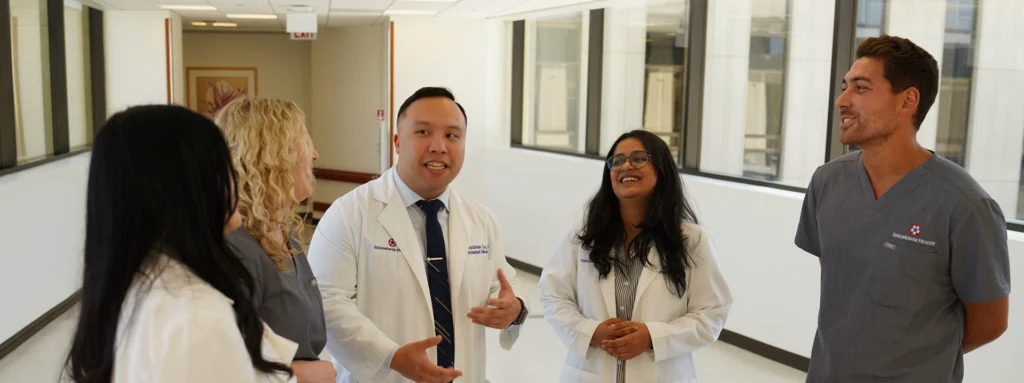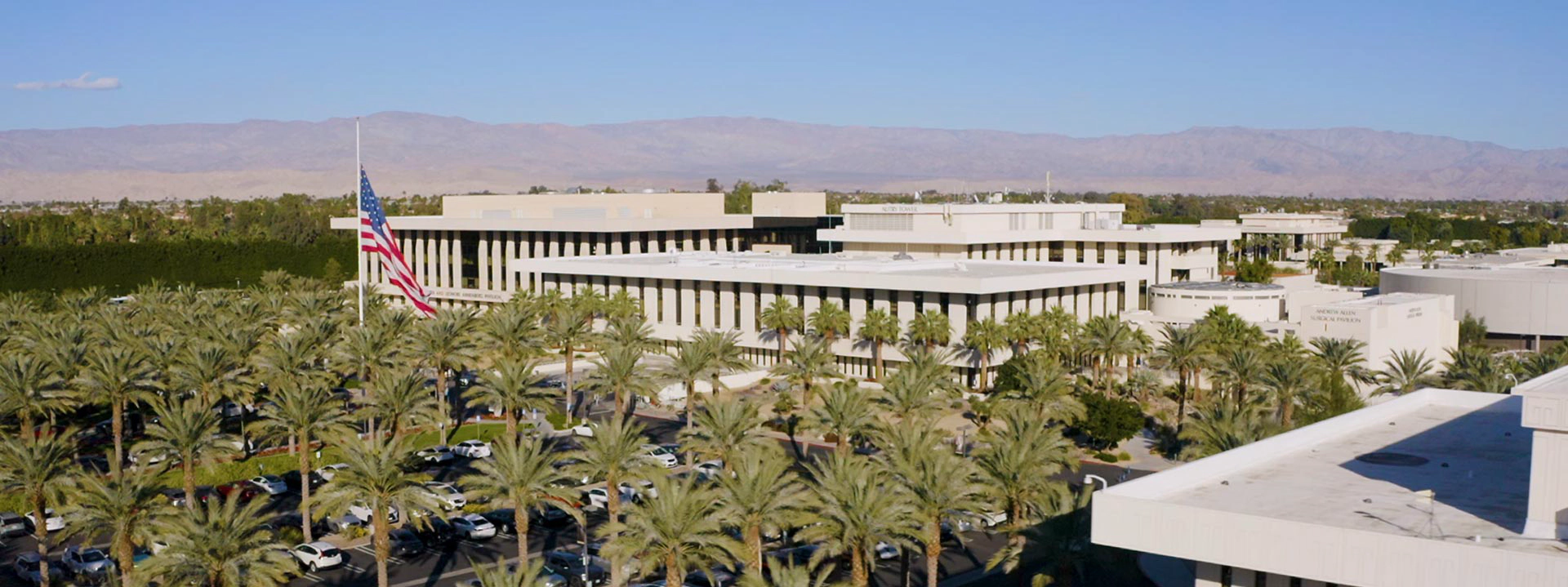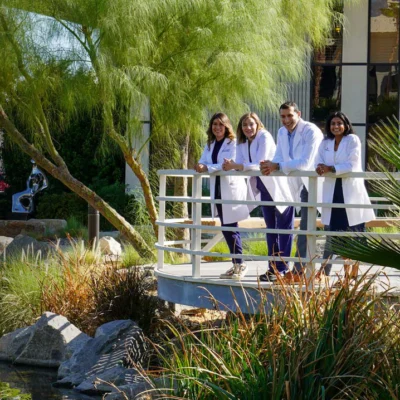Clerkships
Eisenhower Health’s Graduate Medical Education Program has a strong commitment to teaching medical students. Eisenhower Health routinely hosts medical students upon approval of an affiliation agreement. Our main key focus is to provide excellent teaching service to all students.
Clerkships give students the experience and opportunity in all aspects of the hospital setting. Our rotation opportunities include general inpatient services, emergency department and various other departments that allow learning by viewing and doing. Students are shadowing practicing preceptor MDs as well current residents throughout the rotation. Our goal is to provide the fundamentals in the value of teaching and management of care.
Eisenhower Health does not sponsor any visas for international students. Please only apply if you have a U.S. citizenship, green card, and/or employment authorization document.
Information & Dates
Emergency Medicine Sub-I
Clerkship Directors
Tam Le, DO / Iman Rasheed, MD
Description
This four week clerkship is designed for the student to see urgent and emergent cases independently, and then present the cases to the attending physician who will verify the H&P in order to develop a plan for evaluation, treatment, and disposition.
Expectations and Goals
The student will be exposed to the specialty of emergency medicine, experience the initial approach to patients in need of emergent medical care, and will become more comfortable with procedures common in emergency medicine.
Prerequisite:
Completion of third year of medical student
Duration:
4 weeks
Location:
EMC Tennity Emergency Department
Time of rotation:
14 ten-hours shifts
Scheduled for 5am, 9am, 10am, 3pm, and 7pm
Required education sessions:
- Weekly Conferences (Every Thursday)
- Procedure Workshop (First Tuesday)
- Student Presentations (Third Thursday)
- SAEM Exam (Fourth Friday at 8am)
Important notes:
We limited the number of learners in the emergency department to ensure the quality of the rotation. Therefore, we offer the rotations to student who are applying to emergency medicine residency. Additionally, medical students who rotate through our Emergency Medicine Clerkship and apply for our residency program are all invited to interview and should not use an AAMC preference token for our site. Do not apply through VSAS website.
Available Dates for 2025-2026
| June 2 – June 29, 2025 |
| June 30 – July 27, 2025 |
| July 28 – August 24, 2025 |
| August 25 – September 21, 2025 |
| September 22 – October 19, 2025 |
| October 20 – November 16, 2025 |
| November 17 – December 14, 2025 |
| December 15, 2025 – January 11, 2026 |
| January 12, 2026 – February 8, 2026 |
| February 9, 2026 – March 8, 2026 |
| March 9, 2026 – April 5, 2026 |
| April 6, 2026 – May 3, 2026 |
| May 4, 2026 – May 31, 2026 |
| June 1, 2026 – June 28, 2026 |
Emergency Medicine Ultrasound
Clerkship Director
Ami Kurzweil, MD
Description
In order to provide medical students with hands-on emergency medicine ultrasound experience, active participation in performing ultrasound, reviewing learning materials are emphasized.
Practical and didactic experience that will enable medical students to become proficient with routine Emergency Ultrasound (EUS) applications. Medical students will gain understanding of both indications and limitations of ED-US, as well as staying up to date with most current ED-US literature and research. By end of rotation, medical students will have completed a curriculum covering basic and advanced EM-US applications and will be able to fully integrate EM-US into their daily practice.
Expectations and Goals
The course consists of experiences in performing ultrasound in the ED to aid patient care, weekly conferences, QA session and summary report presentations.
The Ultrasound (US) rotation will consist of a 4 week block with 20 US shifts in the emergency department (Mon-Fri). 4 of those shifts will include 4 hours of hands-on scanning and training directly supervised by Ultrasound Faculty. Medical students will also participate in 1 day/week ultrasound video review (quality assurance – QA) sessions with Ultrasound Faculty. The medical student will then have an additional 14 shifts wherein they will spend most of the day scanning patients and doing US guided procedures under direct supervision of ED attending staff. Depending on scheduling, the medical student may be on the rotation independently or concurrently with other medical students or residents.
The medical student is expected to perform 150-200 ultrasound scans over the course of the month and become proficient in procedures such as ultrasound guided IV’s. The medical student will also present an ultrasound research article of their choosing to the ultrasound faculty. They are also expected to take an end of rotation multiple choice test and hands-on ultrasound assessment.
Medical students per block: capped at 2 per block
Schedule is Monday – Friday from 9am – 5pm
Available Dates for 2025-2026
| June 2 – June 29, 2025 |
| June 30 – July 27, 2025 |
| July 28 – August 24, 2025 |
| August 25 – September 21, 2025 |
| September 22 – October 19, 2025 |
| October 20 – November 16, 2025 |
| November 17 – December 14, 2025 |
| December 15, 2025 – January 11, 2026 |
| January 12, 2026 – February 8, 2026 |
| February 9, 2026 – March 8, 2026 |
| March 9, 2026 – April 5, 2026 |
| April 6, 2026 – May 3, 2026 |
| May 4, 2026 – May 31, 2026 |
| June 1, 2026 – June 28, 2026 |
Emergency Medicine Community Medicine & Health Equity (CMHE)
Clerkship Director
Victor Cisneros, MD, MPH, CPH
Faculty, Department of Emergency Medicine
Director of Diversity, Equity, and Inclusion, Graduate Medical Education
Director of Community Health Outreach, Eisenhower Health
Description
Welcome to our Social Medicine & Health Equity Medical Student Elective in the Emergency Department. Here, the intersection of social determinants of health, society, and healthcare takes center stage. Patients feel the impact of shifts in social policy, economic factors, housing, and health insurance. The Emergency Department has long served as a safety net within our healthcare system, providing Emergency Physicians with a distinctive lens to fathom the intricate interplay between these social dynamics and the care received by our underserved patients. Our goal is to expose and educate students on the critical links between social determinants of health and emergency department care.
Expectations and Goals
Students will work under direction of Dr. Victor Cisneros, Emergency Medicine faculty, and Resident physicians to learn the essential components of social emergency medicine, population health, and health disparities:
- Develop an understanding of importance of the social determinants of health and their relationship to patients, their care and their outcomes
- Learn the evaluation and workup of common emergency medicine patient presentations as they are impacted by social needs
- Participate in departmental, institutional, and community centered educational activities
- Learn and attend weekly Street Medicine Program
- Learn and work closely by shadowing our social worker team
- Mentorship from faculty and residents
- Elective consist of some shifts in the emergency department
- Readings and didactic focusing on social issues in emergency medicine
- Ultrasound education will be incorporated
- Participation in community service events as available
Requirements
- MS3 or MS4 that has completed USMLE Step 1 and/or COMLEX Level 1
- Good academic standing
Location
EMC Tennity Emergency Department
Street Medicine Program - Mobile Clinic
Available Dates for 2025/2026
2 or 4 week rotation, dates flexible throughout year.
Max of two Medical Students per 2 or 4 week block rotation.
Required Education Session:
Orientation (First day of Orientation)
Weekly Conference (Every Thursday morning)
Weekly Street Medicine Program (Every Tuesday afternoons)
Possible Scholarship:
For qualified applications, for more information see Community Medicine and Health Equity Scholarship
Social Medicine and Health Equity Teaching Modules/Topics
- Language
- Culture & Race
- Gender Identity
- Health Literacy
- Homelessness, Housing conditions
- Financial Strain/Instability, Debt
- Food Insecurity
- Medical Legal Needs
- Immigration
- Human Trafficking
- Incarceration
- Healthcare Coverage and Access to Care
- Transportation
- Education
- Substance Use Disorder
- Firearm Violence
- Interpersonal Violence
- Implicit bias & microaggression
Family Medicine Inpatient Sub-I
Clerkship Director
Rajdeep Brar, MD
Description
This four week sub-internship is designed to include the fourth-year medical student as a core member of the Family Medicine Inpatient Service team.
Expectations and Goals
The sub-intern will assess acutely ill patients, formulate appropriate differential diagnoses, and develop evaluation and treatment plans using current evidence-based guidelines. Additionally, the sub-intern will model Family Medicine at the bedside by adopting a patient- and family-centered approach to care, engaging patients in shared decision-making, partnering with patients’ families of choice, and communicating with each patient’s primary care provider to improve care transitions from admission through discharge.
Medical student per block: 1
Available Dates for 2025-2026
| June 2 – June 29, 2025 |
| June 30 – July 27, 2025 |
| July 28 – August 24, 2025 |
| August 25 – September 21, 2025 |
| September 22 – October 19, 2025 |
| October 20 – November 16, 2025 |
| November 17 – December 14, 2025 |
| December 15, 2025 – January 11, 2026 |
| January 12, 2026 – February 8, 2026 |
| February 9, 2026 – March 8, 2026 |
| March 9, 2026 – April 5, 2026 |
| April 6, 2026 – May 3, 2026 |
| May 4, 2026 – May 31, 2026 |
| June 1, 2026 – June 28, 2026 |
Internal Medicine Sub-I
Clerkship Director
Ayed Fakhoury, MD, MIB
Description
This four week clerkship is designed to provide an in-depth exposure to high quality care in the inpatient setting. This rotation differs from the traditional medicine rotation in that students have the opportunity to be exposed to more patients, as multiple patients are admitted each day, rather than on a rotating call schedule.
Expectations and Goals
The rotation focuses on evaluation and management of common hospital based internal medicine pathology and inpatient medical consultations on surgical patients, students work directly with hospitalists on the service without the involvement of house staff.
Internal Medicine Requirements
- Applicants should apply after the completion of the Internal Medicine Core Clerkship in order to have their transcripts reflected.
- Please apply after taken the USMLE Step 1
Available Dates for 2025-2026
| June 2 – June 29, 2025 |
| July 28 – August 24, 2025 |
| August 25 – September 21, 2025 |
| September 22 – October 19, 2025 |
| October 20 – November 16, 2025 |
| November 17 – December 14, 2025 |
| December 15, 2025 – January 11, 2026 |
| January 12, 2026 – February 8, 2026 |
| February 9, 2026 – March 8, 2026 |
| March 9, 2026 – April 5, 2026 |
| April 6, 2026 – May 3, 2026 |
| May 4, 2026 – May 31, 2026 |
| June 1, 2026 – June 28, 2026 |
Psychiatry Sub-I
Clerkship Director
Dakota Carter MD, EdD, FAPA
Description
This four-week clerkship is designed for the student to see psychiatric cases of varying acuity independently and/or jointly with faculty on the Consult-Liaison Service and in the Ambulatory/Outpatient Clinic. Students will also have opportunities to observe and support in transcranial magnetic stimulation evaluations and mappings/determinations.
Expectations and Goals
The student will be exposed to the specialty of psychiatry, experience the initial approach to patients in need of psychiatric care on the medical floor and Emergency Department, and will become more comfortable with outpatient treatment approaches with medication management and psychotherapy.
Prerequisite:
Completion of third year of medical student
Duration:
4 weeks
Location:
Eisenhower Behavioral Health
Time of rotation:
Monday-Friday, 8AM-5PM.
Required education sessions:
- First Tuesday of each month: Journal Club, 12-1PM
- Third Tuesday of each month: Case Conference, 12-1PM
- Thursday: Grand Rounds (as appropriate), 12-1PM
- Others, as assigned
Available Dates for 2025-2026
| January 12, 2026 – February 8, 2026 |
| February 9, 2026 – March 8, 2026 |
| March 9, 2026 – April 5, 2026 |
| April 6, 2026 – May 3, 2026 |
| May 4, 2026 – May 31, 2026 |
| June 1, 2026 – June 28, 2026 |
Simulation Center
Clerkship Director
Solomon Sebt, MD
Description
This Elective is designed to provide participants with a comprehensive understanding of simulation education in the medical field. Participants will explore the various applications of simulation, ranging from resident and non-physician education to quality improvement initiatives and working in the emergency department. They will delve into educational theory, learn how to create effective simulation scenarios, gain hands-on experience with simulation technology, and explore potential career paths in simulation education. They may also help chief resident with QI project only during their rotation time. This elective also offers opportunities for research and networking within the simulation community. They will also participate in a certain number of EM shifts with the program director and other potential community medicine/ outreach opportunities.
Learning Objective:
- Advanced Training in Simulation in Medicine
- Applications of Simulation
- Education Theory and Debriefing
- Literature Review and Current Publications
- Creating Simulation Cases
- Simulation Technology
- Running Simulation Cases
- Simulation as a Career Path
- Research Opportunities
- Networking and Professional Development
- Assisting Simulation Director
- Quality Improvement and Institutional Involvement
Weekly Routine (2-4 weeks) 40hrs/wk
- Day 1: Emergency Department Shift with Simulation Director
- Day 2: Simulation Orientation Shift/ Simulation Day ( Ongoing sim center activities)
- Day 3: Participate in Quality Improvement projects/Community Medicine experience
- Day 4: Work with Simulation Chief/Simulation Clinical Faculty on creating simulation manuscript
- Day 5: Simulation Center Activities
Clinical Objectives:
Tech Class – Elective rotator should schedule an educational session with our team in order to learn the basic operation of our simulation room and control rooms. By the end of the session, rotator will be comfortable with:
- Start up and shut down the manikin and software for the room
- Be able to start a simulation case and be able to operate the basic functions of the
manikin in the software. - Be able to use the smart TV and project images into the sim room. Be able to set up the smart TV as a white board.
- Sign in and out process
Debriefing and Case Writing – Elective Rotator will participate in interactive simulation sessions with the Simulation Director. This will typically take between 2-3hrs on various occasions.
Sim Case Presentation – At the end of the rotation, he/she should develop their own case and teaching plan with the help of and guidance of the simulation director.
Prerequisites: Medical students and PGY1-3 (Open to all specialties)
Note: The course structure and content may be subject to adjustments based on the specific needs and interests of the participants and the availability of resources.
Available Dates for 2025-2026
| June 2 – June 29, 2025 |
| June 30 – July 27, 2025 |
| July 28 – August 24, 2025 |
| August 25 – September 21, 2025 |
| September 22 – October 19, 2025 |
| October 20 – November 16, 2025 |
| November 17 – December 14, 2025 |
| December 15, 2025 – January 11, 2026 |
| January 12, 2026 – February 8, 2026 |
| February 9, 2026 – March 8, 2026 |
| March 9, 2026 – April 5, 2026 |
| April 6, 2026 – May 3, 2026 |
| May 4, 2026 – May 31, 2026 |
| June 1, 2026 – June 28, 2026 |
Clerkship FAQs
For GME, Visiting Resident, and Observer Rotators, these FAQs provide guidance on campus access, parking, study spaces, resources, and important rotation policies.
Can I visit the campus or take a tour before starting my clerkship?
Unavailable for prospective students or students that have been accepted but are not yet scheduled to start.
Campus tours are given upon orientation as per instructions of the Clerkship Coordinator’s orientation emails.
If you have any questions or concerns regarding your application or Eisenhower Health’s rotation, please reach out to the Clerkship Coordinator:
- Clerkship Coordinator – Desiree Carcamo, M.S.
- DCarcamo@EisenhowerHealth.org
- (760) 837-8248
Where am I allowed to park during my clerkship rotation?
Please only park in Employee Parking lots G-2, G-3, or F.
Parking in patient, physician, or resident spaces may result in a citation or towing by Eisenhower Health’s Parking Enforcement.
What study spaces are available on campus?
You have several options for study spaces on campus:
- Eisenhower Health Cafeteria – Main Building Basement
- Café 34 – Wright Building
- Any outside seating available throughout the Eisenhower Medical Center campus
You may also contact the Clerkship Coordinator to reserve the GME Conference Room in the Annenberg Health & Sciences Building, available Monday to Friday from 8:00 AM to 5:00 PM.
Where can I get lunch during my clerkship?
The Annenberg Health & Sciences Building cafeteria is available only after 12:30 PM. For those on campus, you may take one lunch portion if available.
- Café 34 – Wright Building: 10% discount with badge (excludes beverages)
- Eisenhower Health Cafeteria – Main Building Basement: 10% discount with badge
Will I have EPIC access on my personal device as a visiting rotator?
Visiting rotators are not given EPIC access on their personal devices.
What is the policy for requesting an absence during my rotation?
All absences must be approved by your school. Please email proof of your school’s approval to the Clerkship Coordinator.
We ask that you do not schedule any USMLE, COMLEX, or other exams or interviews during your rotation.
Who should I contact if I need help during my clerkship?
-
Clerkship Coordinator – Desiree Carcamo, M.S.
DCarcamo@EisenhowerHealth.org
(760) 837-8248
Handles MS4 Rotation Evaluations, Security, Badge Issues, and Schedules - Security: (760) 837-8200 Ext. 8200
- HR: (760) 837-8500 Ext. 8500
- IT: (760) 837-8585 Ext. 8585
-
Librarian – Nickolas Falk, MLIS, MAiD
NFalk@eisenhowerhealth.org
(760) 837-8763
What is the process for returning my badge at the end of my rotation?
On your last day of rotation, please return your badge to the Clerkship Coordinator.
Badges can be returned at:
- Annenberg Health Sciences Building, GME Suite 201
- Monday to Friday, 8:00 AM – 5:00 PM
Eisenhower Health requires all employees, including all Visiting Rotators, to be fully vaccinated and upon the start of their rotation, each visiting rotator will need to provide proof of vaccination to Employee Health.
For more information, please contact:
Clerkship Coordinator
Desiree Carcamo
DCarcamo@eisenhowerhealth.org.
Apply To Our Clerkship Program
Drop us a line today for a free quote!
